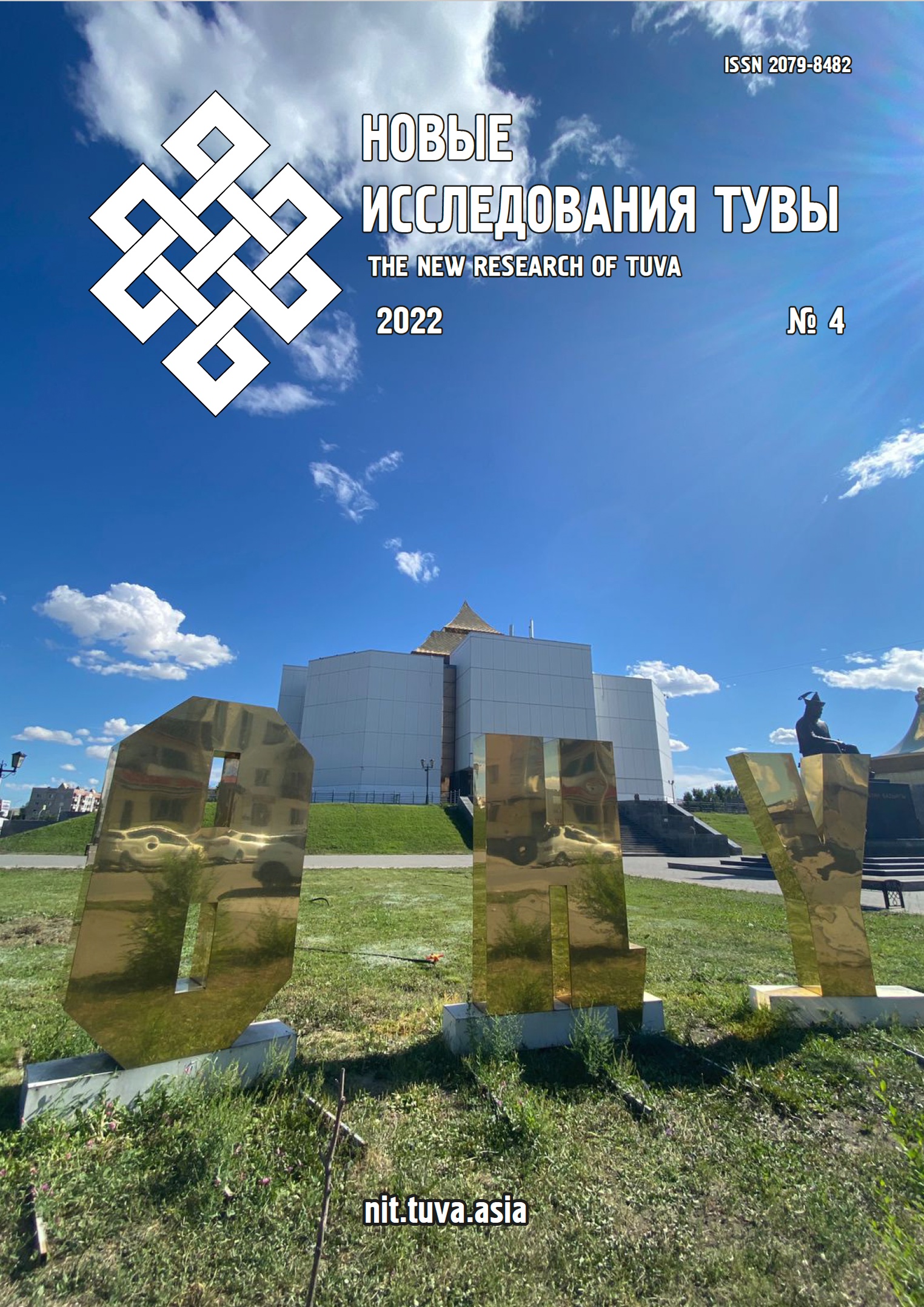Assessment of local residents’ perception of the language situation in the Republic of Tuva (based on the findings of a 2021 field study)
DOI:
https://doi.org/10.25178/nit.2022.4.2Keywords:
bilingualism; Republic of Tuva; Tuvan language; Tuvans; language loyalty; language situation; linguistic prestige; language shiftAbstract
The linguistic situation in the Republic of Tuva is traditionally determined by the co-functioning of the Tuvan language of the titular nation and the nationwide Russian language as the language of interethnic communication. At the same time, despite the obvious numerical superiority of the Tuvans (more than 80% of the population of Tuva), over the past decade there has been a steady linguistic shift towards Russian in the Republic. This fact causes concern among linguists and ethnographers. The article provides an analysis of the current situation in the region as perceived by residents of the capital of the Republic of Tuva, Kyzyl. The language shift is already considered as a fact of life there. A field study (a series of interviews with 25 respondents) was conducted in July 2021 in Kyzyl.
The opinions presented in the article testify to the intensity of the language shift process both in the city of Kyzyl and in other parts of the Republic of Tuva. Most informants expressed deep concern about the low level of the functional development of the Tuvan language in the region and the mass shift to the Russian language among the Tuvans. This is especially evident because of the low or zero level of proficiency in Tuvan among preschoolers and younger schoolchildren as well as amid a decrease in the level of literacy among the native Tuvan speakers.
Most informants admit that if the current situation persists, the Tuvan language may gradually become extinct, though this process is still reversible. According to the informants, the prospects for the preservation and revival of the Tuvan language among the population of Tuva consist in enhancing its stature among the population through state support as well as through the spread of Tuvan culture.
References
Bavuu-Surun, M. V. (2010) Tuvinskii iazyk na sovremennom etape: obrazovatel'nyi aspekt [Tuvan language on modern stage: Educational aspect]. New Research of Tuva, no. 3, pp. 57–71. (In Russ.).
Borgoiakova, T. G. and Bitkeeva, A. N. (2020) Tuvinskii iazyk v pravovom i funktsional'nom izmerenii [Tuvan language in legal and functional aspect]. New Research of Tuva, no. 1, pp. 50–61. (In Russ.). DOI: https://doi.org/10.25178/nit.2020.1.4
Dyrkheeva, G. A. and Tsybenova, Ch. S. (2020) Iazykovye ustanovki i iazykovaia loial'nost' nositelei malykh iazykov v usloviiakh natsional'no-russkogo dvuiazychiia (na primere buriat i tuvintsev) [Language attitudes and language loyalty of minor language speakers under the conditions of national-Russian bilingualism: The case of Buryats and Tuvans]. New Research of Tuva, no. 1, pp. 62–74. (In Russ.). DOI: https://doi.org/10.25178/nit.2020.1.5
Lamazhaa, Ch. K. (2021) Sotsial'naia kul'tura tuvintsev i onlain-prostranstvo [Social culture of Tuvans and online space]. New Research of Tuva, no. 2, pp. 115–129. (In Russ.). DOI: https://doi.org/10.25178/nit.2021.2.10
Lamazhaa, Ch. K. and Suzukey, V. Yu. (2019) Tuvinskoe gorlovoe penie kak nematerial'noe kul'turnoe nasledie i kak kul'turnyi brend Tuvy [Tuvan throat singing as intangible cultural heritage and as Tuva’s cultural brand]. New Research of Tuva, no. 2, pp. 72–83. (In Russ.). DOI: https://doi.org/10.25178/nit.2019.2.6
Seglenmey, S. F. (2016) Rol' rodnogo iazyka kak iazyka obucheniia v nachal'noi shkole [Role of the native language as the language of instruction in primary schools]. Vestnik Tuvinskogo gosudarstvennogo universiteta. No. 4: Pedagogicheskie nauki, no. 4 (31), pp. 105–112. (In Russ.).
Sereedar, N. Ch. (2018) Tuvinskii iazyk kak sredstvo obshcheniia tuvintsev: problemy i perspektivy [Tuvan language as means of communication among Tuvans: Problems and prospects]. New Research of Tuva, no. 1, pp. 4–19. (In Russ.). DOI: https://doi.org/10.25178/nit.2018.1.1
Tsybenova, Ch. S. (2017) Sovremennaia iazykovaia situatsiia v Respublike Tyva: sociolingvisticheskii aspekt [Contemporary language situation in the Republic of Tuva: Sociolinguistic aspect] / ed. by G. A. Dyrkheeva. Irkutsk, Ottisk. 170 p. (In Russ.).
Published
How to Cite
For citation:
Kaplunova M. Ya. Otsenka vospriiatiia iazykovoi situatsii v Respublike Tyva mestnym naseleniem (na materiale polevogo issledovaniia 2021 g.) [Assessment of local residents’ perception of the language situation in the Republic of Tuva (based on the findings of a 2021 field study)]. New Research of Tuva, 2022, no. 4, pp. 28-37. (In Russ.). DOI: https://doi.org/10.25178/nit.2022.4.2
Issue
Section

This work is licensed under a Creative Commons Attribution-NonCommercial 4.0 International License.

Author(s) license holder(s) grant rights for their work to the journal (grantee of a license) under the simple non-exclusive open license in accordance with Art. 1286.1 «Open license for a research work, work of literature or fine arts», Civil Code of the Russian Federation.
New Research of Tuva publishes articles under the Creative Commons Attribution-NonCommercial license (CC BY-NC).
Since it is an open license, author(s) reserve the right to upload the article to their institutional repository, submit it to another journal (if it allows republications), or republish it on their own website (in full, or in part).
However, several conditions apply here:
a) The republished version must always contain the name(s) and affiliation(s) of the author(s), the original title and the hyperlink to the original version on the New Research of Tuva website;
b) It must be in open access, free of charge, and no category of readers must be in any way whatsoever advantaged over general readership.
c) should the contribution be submitted elsewhere by its author(s) without substantial modification (30% or more of original text unchanged), the body of the article should contain a disclaimer that the original version was published in New Research of Tuva (with a link to the respective page)
The CC-BY-NC is a non-revocable license which applies worldwide and lasts for the duration of the work’s copyright.








